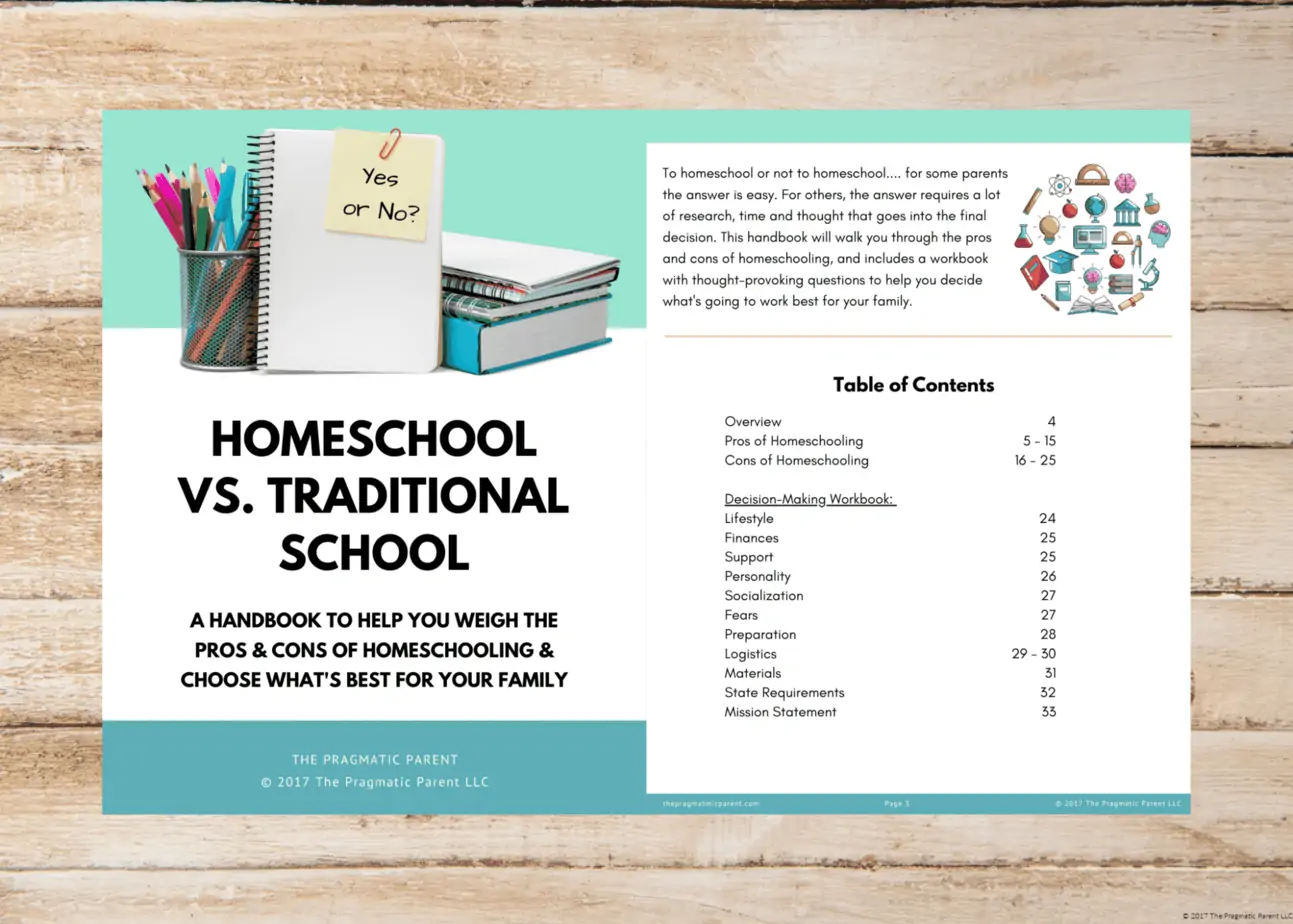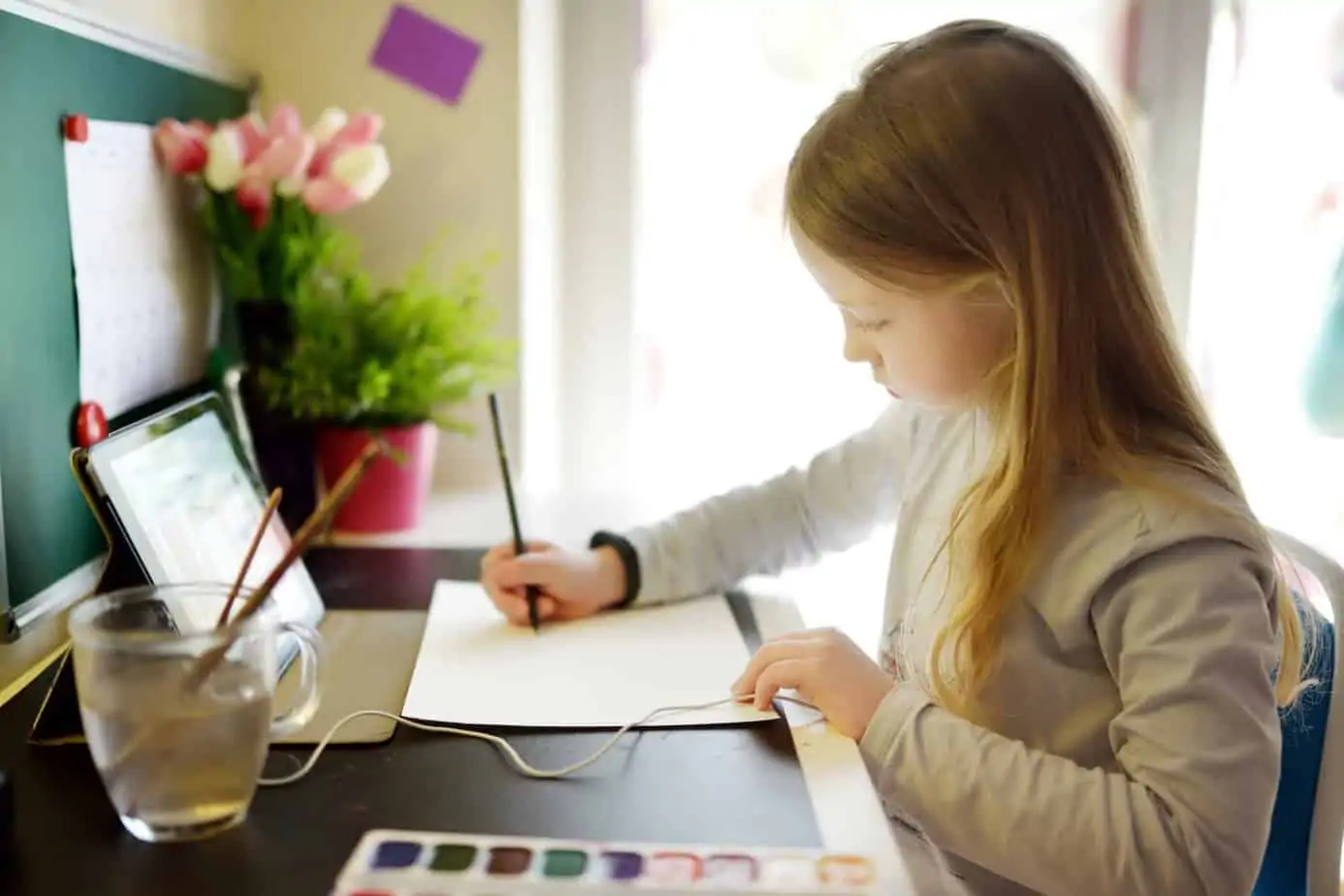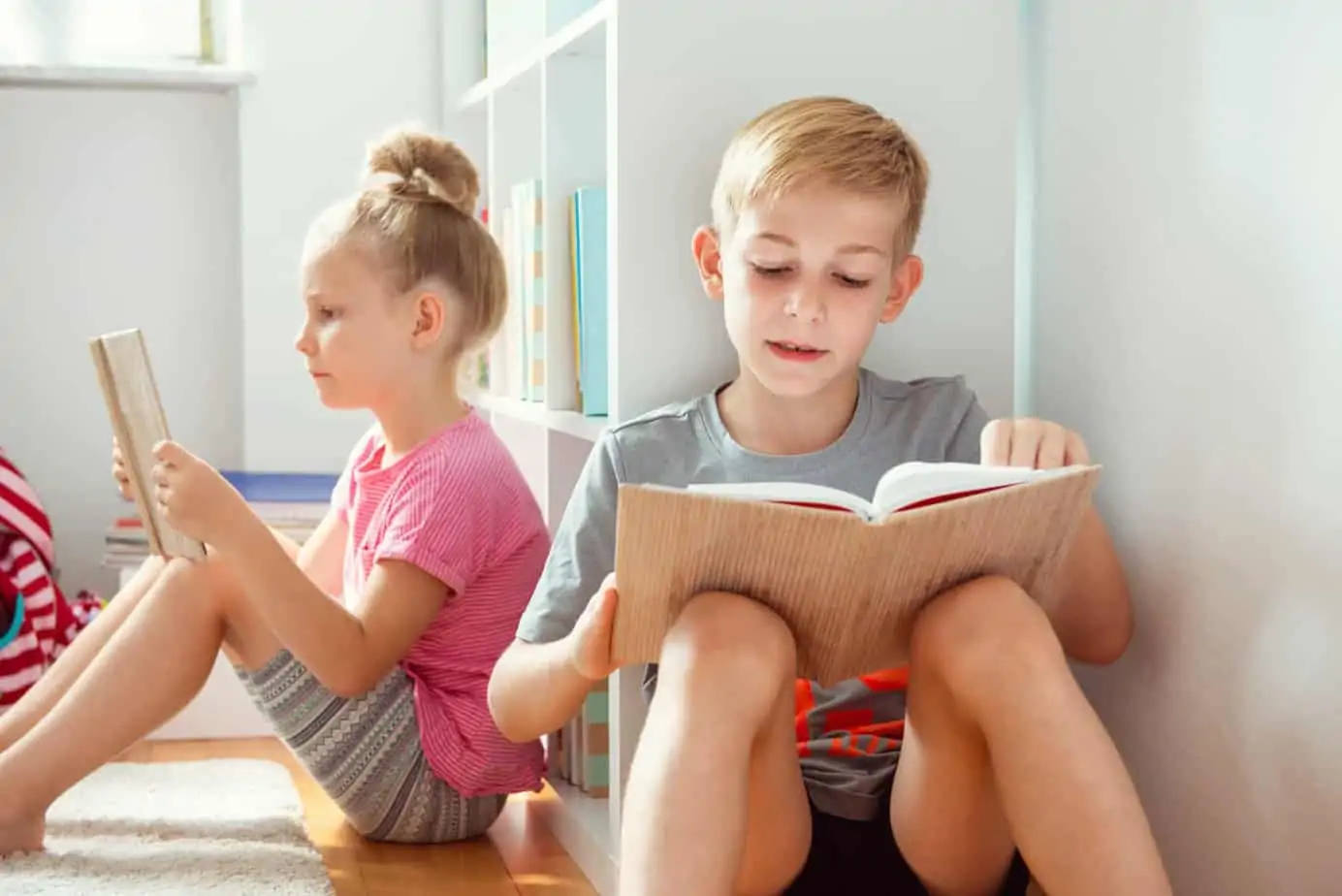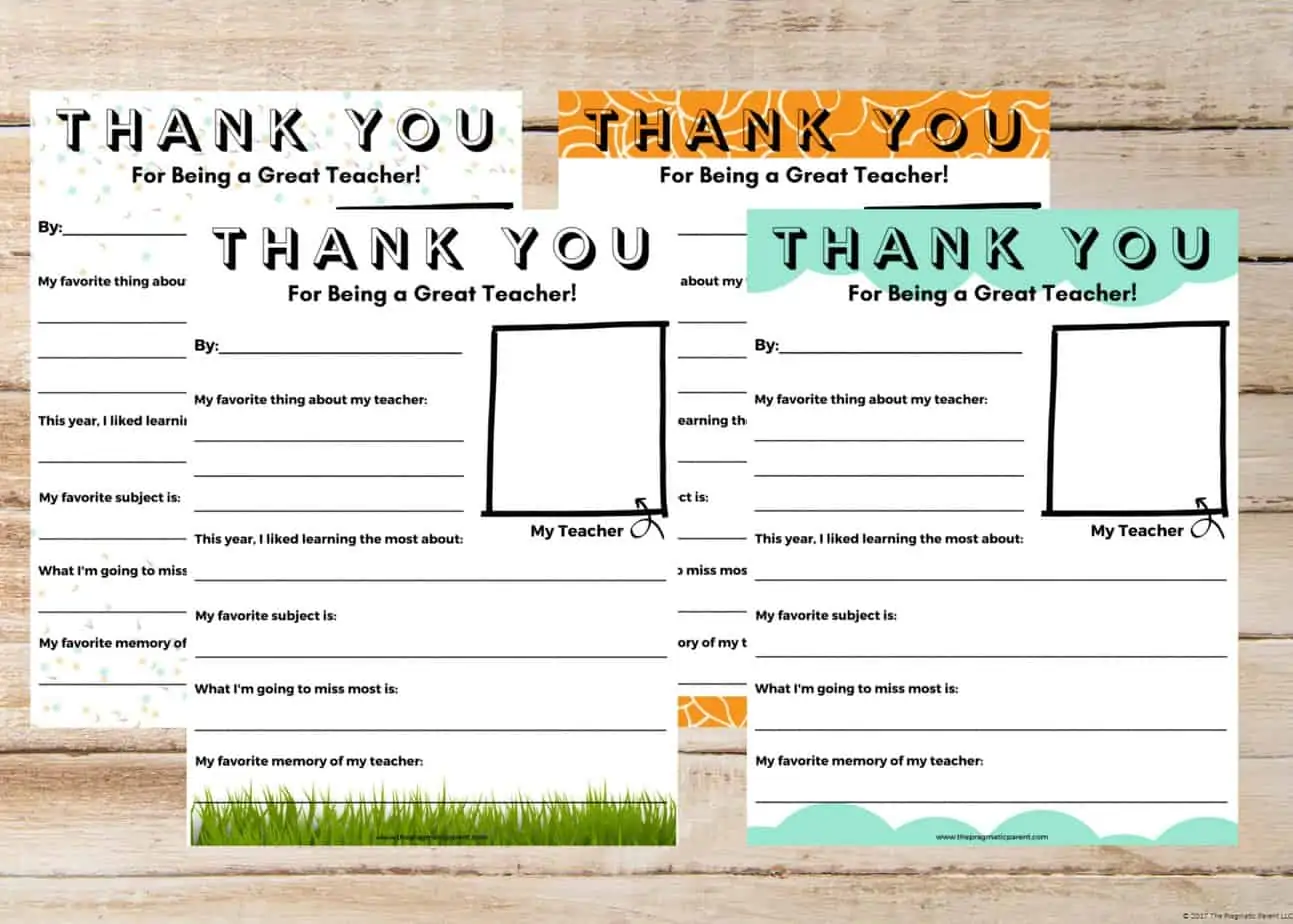Are you considering homeschooling your kids this year or possibly in the future? This is a real-life list of pros and cons of homeschool to help you make an informed and confident school choice decision. (You may also want the complete workbook to help you work through all the factors for and against homeschooling and making your ultimate decision.) Plus, create a routine that works with the huge list of resources in the Routine Bundle.

The Pros and Cons of Homeschooling
I’ve never considered homeschool my three kids until now as the 2020 state of the world has forced me to reconsider public schooling.
Now, homeschool is at the forefront of my mind and since I’ve been weighing option in order to make an informed school choice decision. I thought I’d share the same information I’ve turned to as we make a decision for the upcoming school year, and maybe even beyond this year.
I’ve been doing a lot of thinking.
I’ve been doing a lot of reading.
I’ve been doing a lot of talking.
From those I talk with, those with opinions I respectfully read, those I listen to, what I hear is that parents are split 50/50 right now about whether they will, send their children back to school.
I wanted to find an article that’d tell me how to make the right choice but I was struggling to find something that just said – to homeschool or not to homeschool.
Bottom line, I couldn’t find it.
(Then I created a complete workbook to help parents work through their fears, finances and the pros and cons when it comes to homeschooling in Homeschool vs. Traditional School Workbook so others wouldn’t have to do this leg work either!)
I wanted a no sugar-coated homeschool version of information because honestly, homeschooling doesn’t look easy, but how hard is it REALLY?
- What is the time commitment like?
- What is the realistic cost?
- How do you teach your own child?
- What if you have multiple kids and each child has a different learning style?
- Is it possible to juggle work and homeschool at the same time?
- Does homeschooling socially stunt a child?
- Is homeschooling too overwhelming?
- If we homeschool we still need to do testing?
- Do states have laws you have to be in compliance with if you homeschool?
- How much work is involved?
- Does homeschooling require me to be super detail-oriented?
- How hard is homeschooling for a parents that’s never done it and didn’t go to school to be a teacher?
- What are the benefits for my family if I choose to homeschool?
Then, I wanted to weight the performance, social aspects, emotional factors, and academics of children who are public versus homeschool taught.
Maybe it’s not only a pandemic that has you looking into the homeschool option.
Maybe you’ve been thinking “My child isn’t thriving at school, could I really provide a better education for him? I’m not a teacher. Am I qualified?”
This list of pros and cons about homeschooling in general can help you, too.
BEFORE YOU GO ANY FURTHER: Check out this free webinar – Discover the five social lessons every child must know.
The School Debate: Public / Private vs. Homeschool
Sending children to public school is a personal choice.
Choosing to homeschool your child is a personal choice.
Right now, there are so many more factors making this a different type of choice all together. We’re in a place of decision-fatigue and even the smallest decision like what to wear or what to make for dinner is hard.
It’s all very hard.
There are parents who have to work and have no choice but to send their child to school, and for others like myself who work from home or work for themselves, as well as stay at home parents… what is life as a homeschooling family REALLY like?
Gathering all you need to make a choice about public versus homeschool is draining just thinking about digging into this topic.
I’m here to provide you with real answers, and hopefully some clarity as you weight your school choice for the year and weight the pros and cons of homeschooling versus public school, so you can feel confident about the final decision your family makes.
So Let’s Dive in… a Big Long List of Homeschooling Pros and Cons
To homeschool or not homeschool.
We’ll start with the pros of choosing to homeschool your child, and then work our way into the cons.
This is a very long article on the intricacies of homeschool, so grab your cup of coffee or green juice and let’s get started.
15 Pros of Choosing to Homeschooling
In the US today, there are approximately 2.3 million children who are homeschooled – about 3% of the child population. Annually, this increases between 7 – 15%, although this year the 2020-2021 school year may see a significant increase.
What are the pros of those who choose to homeschool, and statistically, how do academics rate for those with a homeschool education?
A lot of people agree homeschooling is better than public school for many reasons, some of which include:
- more effective learning environment
- lack of violence and peer / societal pressures
- better social development
- lifelong skill development and independent thinking
- better education
- flexible environment
- create an individual learning environment that adapts to the interests, the academic level and the learning style of your children
- have your children experience life outside of textbooks and tests
1. Homeschoolers Have Shown to Score Better on Tests / Higher GPA
One study of 20,000 children who are homeschooled found that they scored better at ACT and SAT tests, and held higher GPA . This was particularly evident in those children who had been homeschooled right through to high school level.
This doesn’t mean having higher test scores and GPA is a given, but having a smaller learning environment, dedicated 1:1 teacher-student attention and a learning style made to fit the individual’s needs (which you won’t find in a classroom for 25 students) are big factors to WHY.
2. School-Related Anxiety Isn’t Prevalent
I talk to parents all the time whose child can’t fall asleep because of anxious thoughts and a “monkey mind” about school work and school related issues with peers. There are also the kids who break down in tears every morning because they don’t want to go to school (I have experience in this area.) Stomach aches and complaining about not feeling well due to emotional stress of school manifests in physical bodies – but this isn’t the case for homeschoolers.
That’s because kids who are taught at home don’t feel peer pressure to “fit in” or are driven to be and act “perfect” and “do it all right” like in classroom and peer environments. There is no pressure to conform, bullying, peer pressures, or other social pressures to deal with.
Home is (generally) a safe environment for children and these fears simply don’t exist.
In the book A Sense of Self: Listening to Homeschooled Adolescent Girls by Susannah Sheffer, the author found teenage girls had no loss of self esteem and developed to be happier and more emotionally mature adults because of their homeschooled upbringing.
3. Customized Education to Fit Learning Styles, Interests, Learning Disabilities & More
The freedom to homeschool means you have the ability to customize their education (to a point – read more about your state’s homeschool laws below) to best fit the child.
This means you have the flexibility to not only hold your classroom in your home, outdoors, at the park, on a boat, at the library, on the road, etc. but you can create a curriculum and environment that fit’s your child’s interests, learning style, and any needs they have.
You get to choose the curriculum and learning approach you take, and trust me, there are a bazillion different ways you can go depending on what your focus is. You can get programs that cover everything, or piece together your learning tools.
Children who are academically gifted or have special needs can be taught at their own pace, instead of going at a mainstream flow, which can be incredibly frustrating and in addition, cause challenging behavior when their school environment is working against them.
Although education is up to the parents, homeschoolers still must comply with their state’s homeschool laws.
This part is really important so make sure you check your state’s laws in order to comply.
For example, where we live in Colorado, we have three different homeschool routes we can take but are mandated to provide the following: 172 days of instruction, averaging four hours per day, in the following subjects: the United States Constitution, reading, writing, speaking, math, history, civics, literature, and science.
If you want to include arts, music, piano lessons, sewing, how to cook or a foreign language, then homeschool gives you this option whereas most public schools focus on the basics above and have gotten further and further away from the arts or students are limited to one time a week of 30 minute art instruction.
If you want to teach religion, homeschool gives you this option, and public does not.
One other thing… if you don’t want to teach about the birds and bees like they do in 5th and 6th grade, you can do this when you see your child is ready.
4. Homeschooling Allows a Flexible Schedule
Homeschooling also gives you the flexibility to set your own schedule including the start and end school times of school, as long as you meet your state’s daily hourly requirement.
Since most children need 10 – 11 hours of sleep per night, and teenagers need 8 – 9 hours of sleep so the idea of starting school at 9am instead of putting them on the bus at 7:30am, can ensure they’re getting the right amount of rest every night and also time for them to eat breakfast, get in the right mindset and be ready to start school instead of rushed or hungry.
If your child focuses best in the morning, you can hold school int he morning. If your child does better in the afternoon, homeschooling gives you the flexibility to have school after lunch if this is best.
This also means you have more opportunities than the 1 – 2 public school field trips a year, for field trips, visits to the museum, galleries, parks and physical activities. This can tie in perfectly with what they are learning at home at the time.
You can also build in your family’s breaks, vacations, and holidays around your homeschool schedule instead of a public school schedule dictating your next 3-day weekend or holiday throughout the year.
This can be a cost-savings for families who take trips and vacations because you aren’t hitting peak vacation times with other families across the country.
5. Teach Your Child HOW to Learn, not just What to Learn
Teaching your child HOW to learn about topics they’re interested in, and the lessons you have planned, this can be one of the greatest gifts you can give them.
A child who knows how to find information, ask good questions, research, study, dig for materials and learn will be better equipped than a child who is consuming information simply to memorize it for a test.
“Let’s look it up” will become a common phrase in your house when you’re teaching your child how to learn.
When a child is given assignments and the freedom to accomplish a project in their own time, instead of being told exactly what to do, teaching kids self-discipline and independence.
When homeschoolers were questioned at college, they reported that they were much more independent in their approach to learning. They stated they were much more independent in seeking out answers and solve learning problems than their counterparts.
Professors can’t hold a child’s hand in college and walk them through how to do research papers and think independently, this is a trait homeschool can teach them though. Being independent learners and thinkers is something that’ll prepare kids well for college and beyond.
John Taylor Gatto, the author of Dumbing Us Down: The Hidden Curriculum of Compulsory Schooling, is critical of the public school system and advocates that homeschoolers learn autonomy in learning and aren’t emotionally or intellectually dependent, such as public school kids. Homeschooling avoid this confusion in learning as kids get 1:1 tutoring, and aren’t grouped in with a large classroom of kids who don’t receive personalized attention.
Universities now recognize many admissions administrators prefer recruiting homeschoolers because of their ability to think independently and do the work to back up their work.
In 1999, Stanford University accepted twice as many homeschoolers compared to publicly and privately educated students.
6. Homeschooling Lets Your Get More Done in Less Time
When you’re teaching your own child, because there isn’t a class of 25 and no waiting in line to walk single-file from one classroom to another room or outside for recess, waiting in a lunch line, unpacking, packing up, resetting from circle time to desks, etc. the same amount of schoolwork takes less time because of the 1:1 learning environment.
Much less time.
Most homeschool learning ranges in time from 2.5 – 4 hours a day (depending on age.) Kindergarten is very play-based and learning is in small, limited doses to match developmental concentration capacity.
7. No School Safety Threats to Worry About
Every year when my kids come home and tell me about active shooter drills they’ve practiced at school, I cringe. I absolutely hate how our children have to be taught how to hide in corners away from windows and be as quiet as possible so a “bad guy” can’t find them.
When you homeschool, there’s less worry about school shooting, bomb threats, bullying, and safety threats to your children.
8. Less Sick Days When Kids aren’t Exposed
Bottom line, is that illness in children spreads like wildfire. When there are 25 kids in a classroom who are always touching tables and school supplies, sneezing, coughing and putting their hands on others… the classroom becomes a petri dish.
Homeschooling kids means less viruses, pinkeye, and even lice spread. Kids aren’t exposed to these things when they aren’t packed in a classroom, lunch room or auditorium with several hundred other kids for 7 hours a day.
Homeschooled children also have much more access to fresh air and sunshine. Fresh air and vitamin D are important for the immune system and when kids head back to school every year, being stuck inside without access to these two critically important components that maintain a person’s immune system, is a big factor to WHY flu season happens.
9. There ARE Opportunities to Develop Social Skills
Are homeschooled kids socially awkward?
We know that homeschooled children can be well socialized if the parent is willing to do the work. Children can be socialized in terms of peer interaction and learning cultural normals (not being socially awkward in social situations when they’ve had experience learning how to act around peers.)
Through social media there are homeschool groups all over who do meet-ups, play groups and field trips together. Additionally, there are organizations who offer physical education classes, music lessons, and education opportunities specifically for homeschoolers.
This gives parents the opportunity to have kids get together to build these important social skills.
With homeschooling, because kids aren’t competing for attention, or picking up rude, disrespectful behavior, they learn how to interact respectfully with people of all ages.
However, it is up to the parent to seek out and ensure these opportunities are given to children.
10. No Unexpected Snow Days, Sick Days or Cancellations
When you homeschool, you don’t have to worry about what to do if school is delayed for snow or weather, or your child has to take a sick day. You’re more equipped to work through these and don’t so you don’t have to scramble to call into work or line up a back-up plan or call in the reinforcements.
11. More Time for Unstructured Play and Free Time to Pursue Hobbies
Homeschool days are shorter than public and private school days. That’s a fact, which also means this leaves more time in the day for kids to be KIDS. There is room for unstructured free play and to allow kids the opportunity to be in nature, explore their interests and invest time in their hobbies.
Kids will quickly learn about time management when they’re homeschooled, and it won’t take them long to figure out that if they focus on their schoolwork, they’ll have more time int he day to do something that interests them.
12. Homeschooling Gives You the Time & Opportunity to Teach Kids Crucial Life Skills
How many times have you heard things like:
- I wish my child would learn how to cook
- I wish my child would learn about managing money
- I wish my child would learn about healthy eating (and not the antiquated food pyramid with school paid sponsors with milk and processed meats)
- I wish my child would learn how to (fill in the blank)
Homeschooling your kids gives you the opportunity to teach life skills along the way. You can show your kids how to make and stick with a budget, do laundry, grocery shop and meal plan, cook, make repairs and do handy work and overall, be self-sufficient.
This also gives you the chance to have your children (and entire family) volunteer during the day.
The more they learn, the more they can help the family, and help themselves in the future.
13. Your Learning Environment Can Be Adjusted on the Fly
Some curriculums will be easy for you and your child and some depending on their learning style, as well as your teaching style will just not work. All of this is normal as you figure out what works and doesn’t on your homeschool journey.
If you have a mission statement about WHY you choose to homeschool your children, then you you can stop and say,
- Is this important?
- Can or should I let this go?
- Does this help me achieve my overall goal?
- Is there a different path I can take?
- Do we need to pause today and work on a heart issue?
Depending upon your answer, you can pivot.
Homeschooling really isn’t about the curriculum you choose, it’s about the lifestyle and environment you create in your home. It’s about finding what works best for you and your children and sometimes that means going outside, it means taking a field trip or baking and cooking during the day.
Some days it means adapting to the circumstance to teach and learn differently and homeschool allows you to do this, whereas public school is a “do it or face the consequences” style of teach and learn, which as most parents know, putting a child in a box isn’t the best environment nor solution.
Homeschooling provides you the opportunity to create a love for learning, and it’s really about raising children to be amazing, adaptable, well-rounded adults.
14. You Don’t Have to be a Certified Teacher to Teach Your Child
You don’t have to be certified to be your child’s teacher. (No state law requires homeschool teachers to be certified.)
Research shows there’s little difference between the academic achievement of homeschooled students whose parents were certified teachers and those whose parents were not.
They both scored on average much higher than their counterparts in public school.
Yes, you are legally responsible for teaching your child and it’s up you to make it work, learn what you need to learn, and teach your child is a positive way.
15. Additional Benefits of Not Being in a Public / Private School
- No homework (Do kids really need more work after being in school for 7 hours a day? When you determine your own schedule, they don’t.)
- No bus lines, no waiting for pick ups, no leaving in the middle of the day to head to school or meet your child at the bus stop.
- No uniforms
- No packing lunches
- No more paperwork – homework, permission slips, forms
- No standardized testing
- No fundraisers and volunteering in the classroom
Family Related Homeschool Benefits
- More time for connection
- More opportunities for family time
- No missed milestones
- Time for additional extra curricular activities (gymnastics, girl/boy scouts, sports, art classes, etc.)
- More time to read a loud and together
- Less rushed days and meals with one another
What are the Disadvantages of Homeschooling?
With all the good to homeschooling, let’s not leave out the disadvantages. These have to be taken into considering if you’re weighing the school choice option of homeschooling against public or private school.
Many parents have the same concerns about homeschooling, including:
- Time and responsibility for teaching
- Cost
- Socialization
- Patience
- Motivation
- Organization
- Juggling of work as well as home responsibilities
10 Top Concerns & Cons of Homeschooling
1. The Time Commitment of Homeschooling
Unless you choose to piggyback off a planned curriculum or school with a partner homeschool program, it takes a lot of time to pick and plan your curriculum, plan assignments, review the material before you explain it to your child, answer questions, work through challenges and be available during school time.
There are a lot of packaged curriculums, but we all know one-size usually does not fit all. This means, you’ll likely be cherry picking your materials and bundling them together to create your own curriculum, and that’s a lot of work.
If you are a beginner, this can be a very time-consuming and overwhelming start to your homeschool experience.
You’ll also need to consult the accrediting-school or your school district for approval of your child’s customize curriculum in your local area.
It’s the hope when you design your own curriculum, it’ll lead to a fun-filled learning experience for your children, but could also potentially decelerate or accelerate your child’s progress and development. Finding curriculum that is much better than used in conventional schools or equal to is the goal, so this takes a lot of time to weed through everything that’s available.
2. Working and Homeschooling is HARD
See number one. Homeschooling your child requires a certain amount of time to plan, prepare, teach and be present day in and day out.
Working, whether you work for yourself or others, requires a set amount of time each week. If you have a flex schedule to work around schooling, then juggling work can be possible.
However, if you are required to be behind your computer and at a desk from 8am until 5pm each day, then homeschool is likely not going to be a good fit for you, and certainly not for your child.
Many parents have discovered options like alternating work schedules or one parent working from home that allow to allow them to keep a consistent homeschool schedule.
It does take creativity, commitment, and setting boundaries with your time.
A lot of families find that homeschool will practically tie up one parents who is a full-time teacher and supervises the children at home.
If you are used to living as a two income family and are going to go down to one incoming in order to homeschool, this will be a big sacrifice and big slash to your family’s income.
Most families find this sacrifice well worth it for having their children reap the benefits of being homeschooled, but there is a period of adjustment and things can get tough when money is tight or unexpected events happen.
3. Financial Cost of Homeschooling Your Kids
The choice to homeschool comes with a price tag and it isn’t cheap. This may come as a surprise to many since homeschooling can be thought of as being less expensive.
Public school is free (although technically your taxes pay for it.) Textbooks at school are free. Certain school projects and extra curricular activities are free. In some places, meals are free for students.
Yes, you have to pay for school supplies when your child attends public school, but you’re also going to be buying these supplies and more when you homeschool where they may be stocked at a school.
Curriculum and materials to homeschool range from free, to one-time cost or monthly fees per child, depending on the curriculums you choose to use. In addition, any computers or electronic devices that need to be purchased and certainly add up because they’re a bigger expense than a book or two.
You’ll also pay for every sport, every music lesson, every interest your child has.
In addition, there are costs of having homeschool at home such as more electricity, meals, temperature control and any furniture you have to / want to buy for their “classroom.”
Even if your homeschooling budget is limited, with a little creativity and research, you can provide your child an engaging education customized to their learning style and needs.
For an overview of the cost of homeschooling, where to find curriculum, and how to access free or inexpensive curriculum, check out this article and this one. You may also be interested in applying for an HSLDA Compassion Curriculum Grant.
4. There is no Time Off / Alone Time When You’re a Homeschool Parent
Choosing to homeschool is a commitment to a certain lifestyle.
If you are an introvert who likes to have a lone time or quiet time, then having your children around all day long may feel a little suffocating. If you are an extrovert and don’t like being confined to your home, this school choice can give you some flexibility to leave the house, but no matter where you go, your children will be with you.
Your children will be with you all the time, especially when they are too young or irresponsible to be left at home alone. Running errands will be a family affair.
There are no coffee dates or lunch with friends. Want a massage in the middle of the day? Forget it, unless you are able to afford an occasional babysitter or can find a restaurant with a play area.
Having adult conversations, aside from arranged play groups, field trips, and extra curricular activities is going to involve additional planning, and likely some babysitter money.
5. Specialists and Interventionists Assistance will Have to be Paid Out of Pocket
Your taxes pay for public school, and they also pay for school systems to offer speech therapists, IEP (504) support, counselors, special education teachers and other professionals to work and help your children for free during school hours.
If your child has a speech delay, speech impediment, learning disability or delay, these free resources are hard to pass up, especially when you start looking at the costs to seek help and pay for it out of pocket.
6. Socialization & Sports for your Child Requires Extra Effort
The socialization and understanding of cultural norms rests solely on the parent’s shoulders, which means if you’re an introvert, you’re going to have to step out of your comfort zone. A lot and often.
Socializing has to be intentional and you’ll have to put in the effort to get your kids outside the four walls of your home.
This are no school organized groups your children can join, or a school play to sign up for. Your budding musician can’t join band, or STEM club so you’ll have to consider private lessons, hiring a tutor or signing up for extracurriculars.
This is especially true for sports such as basketball, soccer, volleyball, football, baseball, softball and track and field which are generally offered through the school. You’ll have to seek out sports offered through the local recreation department, and a good way to meet other kids your children’s age.
Individual sports and activities such as dance, swimming, hockey, biking and others will be less of school-driven participation.
7. You Need to Stay Organized and Keep Good Records
You’ll have to look at your state’s homeschool laws, but most states require good record keeping and that means you have to stay organized.
There isn’t a lot of paperwork you need to turn into your child’s school district/assigned home school each week, you do have to keep track of:
- curriculum
- attendance
- grades
- test scores
Your child will need a transcript to apply for colleges and many states require proof of passing grades to get a driver’s license.
8. Teachers Know How to Keep Structure
There is a notion I kept coming across which assumes homeschooled children do not have structure to their days. It’s a perception that lack of structure exists because it’s not the same time-management systems traditional school programs follow.
Again, it comes down to learning style and one-size-does-not-fit-all. If your child does really well with routine and functions best with structure, a homeschool environment can be arranged this way to meet his need.
Structure is different for homeschool however because the simple fact that professional educators are trained to stick to a time-based schedule (45 minutes for reading, 1 hour for math, 15 minute recess, and so on.) and their classroom sizes are so large that if they didn’t keep a strict order, it would be complete chaos.
Families who especially switch from public school to homeschooling experienced have a learning curve for setting boundaries and enforcing rules such as no screens, no electronics, no breaks whenever you want, in order to keep structure to the day, but once they establish these rules and boundaries, having a flow to their days isn’t hard.
9. Missed Public School Rite of Passage Events
Look, there isn’t a prom for homeschooled children.
There isn’t a homecoming or school play or senior day, and for many parents who went through public school and have fond memories of these rite of passage type event, the thought of their child missing out on them can be difficult to stomach.
You could always organize a prom-like event, or take your kids to sporting events so they don’t feel like they’re missing out. On the flip side, you aren’t spending hundreds of dollars on a dress they’ll wear once or overpriced tickets to a DJ’d event held at a local country club with cheese and crackers they won’t touch. Just saying.
10. Dealing with Other People’s Opinions
There are a lot of misconceptions about homeschooling and family and friends who learn you’re going this route may not agree with your choice – and probably won’t hesitate to be vocal about how they feel and their difference of opinion.
You may even find yourself being quizzed about the education you are providing your child, or worse, the legalities of it.
Additionally, children may feel misunderstood for being homeschooled, too. A lot of people don’t understand homeschooling and may question you child or kids can be judgmental or exclude a child who is homeschooled.
There is no need to justify your decision to homeschool but you may feel draw to do this more times than you’re comfortable with. Although with a pandemic, I think you’ll have more understanding than the average homeschooler has in the past.
Regardless, are you prepared to stand up to the scrutiny and pressure?
You could also be the top homeschooler in the world, but may have moments of doubt and worry about what you’re doing when others voice their (unwelcome) opinions. One of the major homeschooling cons is having to remain confident and face up to your decision to teach your own child when others don’t agree with your choice.
But then again, one of the best ways to prove someone wrong is to raise a brilliant, kind, well-adjusted, and independent learner, right?
11. You Still Have to Take Care of Your Home
The thought of having a clean house might be dead to you if you start homeschooling.
Just because you’re homeschooling, doesn’t mean the work at home like grocery shopping, cooking, cleaning, laundry and caring for pets stops… but can you keep up with it all?
Your family will be at home more than if they were away at public school, so you’ll have more dirty dishes and messes to keep up with. You’re still running a home, feeding everyone and now have the responsibility of educating and socializing your child.
Providing your children with a stimulating learning environment is a lot of work for one person, but how do you feel about household chores and making 3 meals and snacks on top of that every day for the next so many years?
You can always involve your children in the housework, depending on what age they are and level of cleanliness you like to have for your home. Either way, it’s a factor to consider because your home is where you are going to be ALL OF THE TIME.
So Tell Me… Does Homeschooling Work?
Does homeschooling work?
The short answer is YES and it can be the best thing that’s ever happened for your child and to your family.
Yet, you can’t overlook the challenges and significant impact homeschooling will have on the parent who is the primary teacher, lifestyle, finances, and the mental health of everyone in your family.
Transitioning from a traditional school environment is a seismic shift, and requires a lot of work and period of adjustment for parents and especially children who were previously enrolled in public school and know the difference between the two.
There will be bumps in the road, but overtime homeschooling your children can be a lifestyle and choice you love, however you can’t go into it with rose-colored glasses on. Like anything, getting the hang of homeschooling does take time, realistic expectations, patience and your ability to create a support system around you for when questions and challenges come up.
Homeschool Resources:
- Homeschool vs. Traditional School – Parent’s Workbook
- PreK/K Language Arts Worksheet Packet
- PreK/K Math Worksheet Packet
- Homeschool Routine: How to Do It, Cards to Help & What to Expect
- Homeschool Legal Defense (an excellent resource)
- Time for Learning Curriculum
- Math U See Program
- Abeka
- BookShark
- The Good & The Beautiful
- Oak Meadows
Want even more?
Shop All Parenting Resources
Shop all of our parenting resources from self-regulation tools and managing big emotions to building self esteem and confidence. There are resources for all seasons of life!














